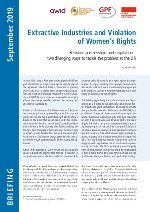Extractive Industries and Violation of Women's Rights
Published on Fri, 2019-10-25 08:29
Between partnerships and regulation – two diverging ways to tackle the problem at the UN The new briefing paper “Extractive Industries and Women’s Rights: Between partnerships and regulation – two diverging ways to tackle the problem at the UN”, by Karolin Seitz and published by AWID, DAWN, Global Policy Forum and Rosa-Luxemburg-Stiftung, presents how women are disproportionately affected by negative social and environmental impacts of extractive industries. The briefing also explains why a new partnership between UN Women and BHP Billiton, launched in June 2018, is very problematic. Similar to UN Women, other United Nations (UN) entities are trying to attract partnerships with the corporate sector. As the case of UN Women shows, potential risks and side-effects of such partnerships are often not properly addressed. This briefing discusses how the human rights impact of business enterprises could be effectively regulated by a UN treaty on business and human rights. The paper argues that such a treaty must comprehensively integrate a gender perspective that addresses the specific impact of corporate abuse on women and marginalized communities and result in a treaty that ensures rights protections, access to justice and effective remedy for all rights holders. The UN should, furthermore, adopt strict rules on engaging with the private sector across the entire system. In order to protect the UN’s independence and integrity from corporate influence and ensure that the organization is able to fulfill its mandate, governments should provide the UN with adequate, flexible, and predictable funding. These risks should also be considered in the preparation of the 64th session of the Commission on the Status of Women and the 25th Anniversary of the Beijing Declaration commemorative events in 2020. Corporate involvement in these events should only play a limited role. Rather than promoting further smart-looking corporate social responsibility projects that tend to “blue wash” a company’s reputation, the UN should be concerned with systematically addressing human rights abuses by corporations. A strong commitment to women’s human rights also needs to be addressed in partnership strategies and other initiatives such as the current negotiations on a UN treaty on business and human rights. Download the full briefing paper here Extractive Industries and Violation of Women’s Rights Author: Karolin Seitz Download the briefing paper here. Source: Global Policy Forum (GPF). |
SUSCRIBE TO OUR NEWSLETTER



